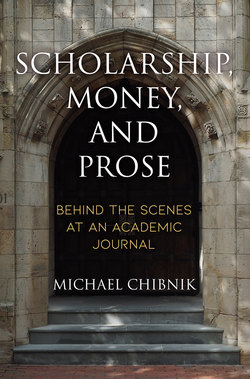Читать книгу Scholarship, Money, and Prose - Michael Chibnik - Страница 6
На сайте Литреса книга снята с продажи.
ОглавлениеPreface
From 2012 to 2016, I was editor-in-chief of American Anthropologist (AA), a major journal sponsored by the American Anthropological Association (AAA). Editing AA was a complicated job that involved working with a large editorial board, six associate editors, a managing editor in California, an editorial assistant at my university in Iowa, and staff at the AAA and our publisher, Wiley-Blackwell. Articles and essays in AA examined an astonishing variety of topics. Issues included research articles, research reports, book reviews, obituaries, interviews, commentaries, vital topics forums, distinguished lectures, and sections on public anthropology, visual anthropology, and world anthropology.
One of my topical specialties is the anthropology of work. Researchers in this field have carried out careful ethnographic studies of farmers, hedge fund traders, truck drivers, geishas, and drug dealers. When I was learning about the complexities of editing AA, I wondered why there was not also an ethnography of the work of academic editors. Their activities, after all, directly affect the careers of anthropologists writing books and articles about other professions. I could not even find a breezy, gossipy memoir about academic publishing similar to those written by editors at popular magazines and commercial presses.
In the 1950s, two editors of AA, Sol Tax and Walter Goldschmidt, wrote numerous short columns for the journal about various aspects of their work. Such essays appeared only sporadically in AA in subsequent years until Tom Boellstorff became editor-in-chief in 2007. Tom wrote a from-the-editor column for every issue about matters related to anthropology and publishing. These essays provided insightful, inside glimpses of a world of editing that most readers of the journal knew little about. Because I enjoyed the columns and thought that they included useful information, I decided to continue them after I took over the editorship of AA.
The from-the-editor columns that Tom and I wrote were the immediate inspiration for this book. Some parts of the book are greatly expanded treatments of ideas that we first explored in our essays. Most of what I say here, however, examines aspects of editing that we never got around to discussing. This book is not intended to be either a definitive study of scholarly editing or a manual of how such editing should be done. Instead, it is a historical and autobiographical account of my experiences and practices at AA. As such, the book is a perhaps unusual hybrid of an ethnography and a memoir that focuses on work. The story I tell must be understood in the context of the particularities of AA and the AAA, the field of anthropology, and my own interests, obsessions, and eccentricities. Although I have done my best to be as straightforward as possible, I realize that many of the events I describe might well be interpreted differently by others. I take some comfort in knowing that such ambiguities characterize all ethnography.
Much of this book is based on articles and essays from AA and Anthropology News (called Newsletter of the American Anthropological Association from 1960 to mid-1974 and Anthropology Newsletter from mid-1974 to mid-1999). In an effort to avoid too much clutter, I have provided in-text citations for information found in these journals only for direct quotes. References to other material from these journals can be found in endnotes. All references to sources other than AA and Anthropology News have intext citations. The bibliography at the end of the book includes both sources cited in the text and sources cited in the endnotes.
